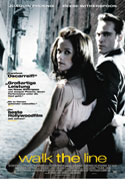

Opening 2 Feb 2006
Directed by:
James Mangold
Writing credits:
James Mangold, Gill Dennis
Principal actors:
Joaquin Phoenix, Reese Witherspoon, Ginnifer Goodwin, Robert Patrick, Dallas Roberts
Based on the books Man in Black and Cash: An Autobiography, the film Walk the Line follows the early years of Johnny Cash (Joaquin Phoenix), beginning with his childhood days, on a small cotton farm in Arkansas during the depression. In spite of his hard life as a sharecropper’s son, he was happy as long as he had his big brother by his side with whom he shared everything – including his two secret loves. His first love was for music and the second was the voice of June Carter (Reese Witherspoon). He faithfully listened to the Carter family gospel sing-a-long on the weekly radio hour. Johnny’s childhood dreams begin to fall apart when his brother tragically leaves his world. This tragedy was the catalyst that spurred Johnny’s song writing lyrics: hard-luck characters seeking faith and redemption.
While serving in the army in the Germany, Johnny purchased a guitar and became a self taught musician. He wrote one song dealing with life in prison. After his army days, he headed for Memphis, Tennessee, to pursue his career in gospel music. He stumbled upon a small recording studio, Sun Studios, which asked for $4.00 a recording. Johnny was so bad that the studio refused to make his recording. Rejection was not apart of Cash’s plan so he broke out his prison song and blew the studio manager away with his burly, storytelling-style of music. According to Sun Studios, the young Cash was "good-to-go" for the 1956 Caravan Tour featuring Elvis Presley, Jerry Lee Lewis, Carl Perkins, Roy Oribson, Waylon Jennings and June Carter. Johnny’s draw was his deep, booming, gravel voice, his life-applicable songs of hard work and human worth, and no one will forget the awesome way he would aim his guitar at the audience. June’s draw was her stand-up comic relief that held the tours together. She was their glue!
Seven years in the making, director James Mangold had the privilege of allowing Johnny and June to critique the first three drafts of this project, to allow them to assist in choosing the actors and to be influenced by their life history before their deaths in 2003. Mangold felt it was fitting to use the title of one of Johnny’s most loved songs because it personified his own struggle to stay on the right path in order to be a good man. Johnny felt that it was a job that he had to work at every single day.
Mangold grabs a hold of a window of opportunity with his film Walk the Line in order to unveil a magical love affair with a timeless style of music and its pioneers. He personifies his narrative by using the early part of the personal stories of J.R. Cash and June Carter Cash as they rose from the birth of Rock and Roll music and held on to a ten year love affair that was only allowed to take place on stage. (Karen Pecota)